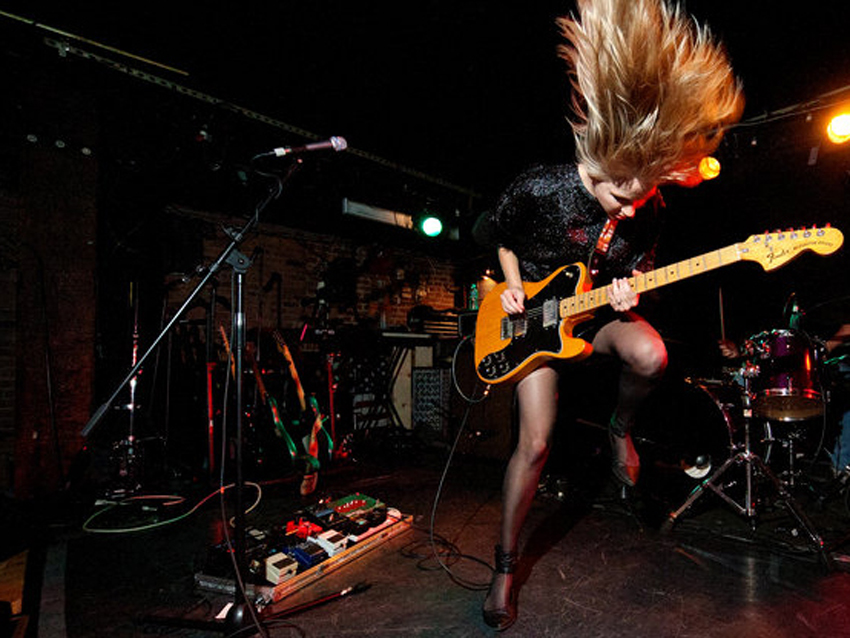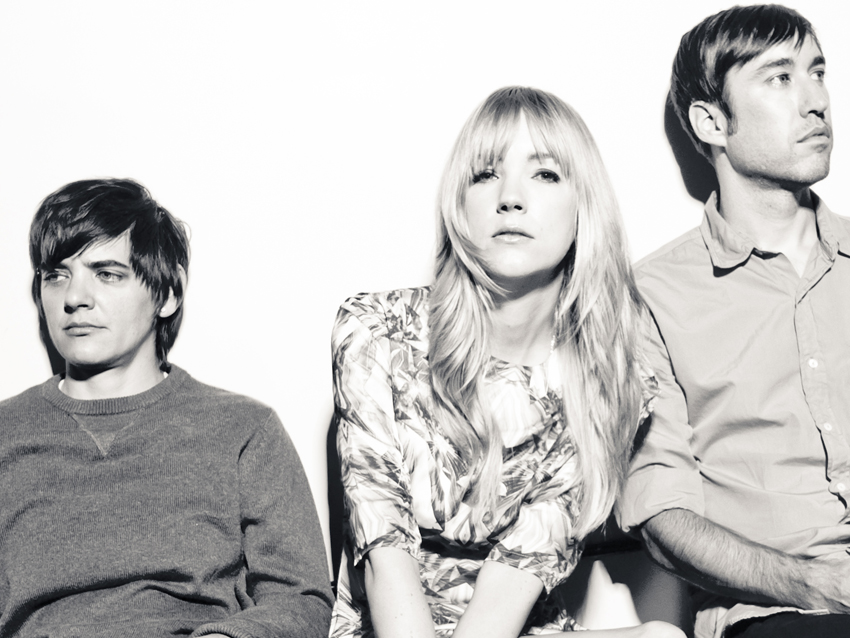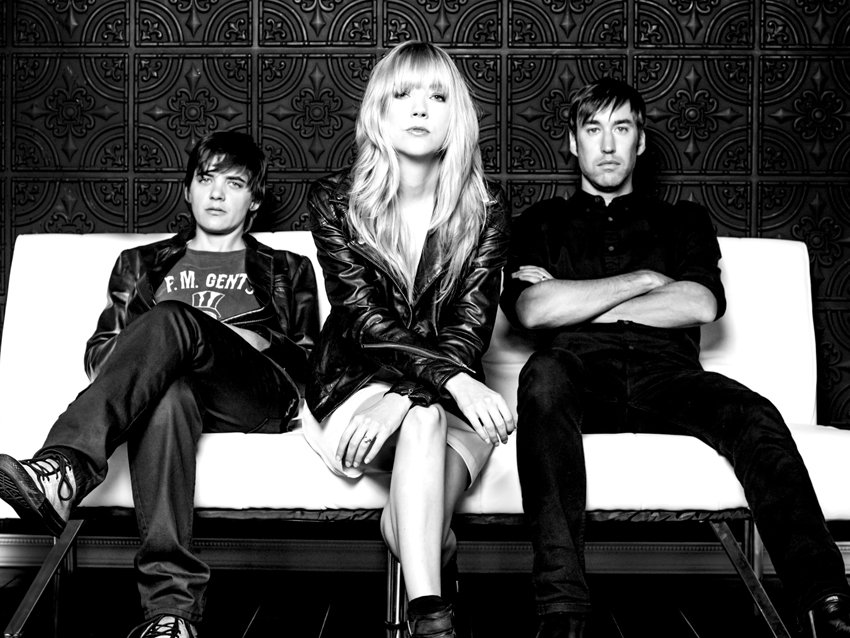
Ume's Lauren Larson talks female guitarists, power trios and new album, Monuments
In 2012, after two years of road work supporting their debut album, Phantoms, the Austin, Texas-based power trio Ume took to Kickstarter to raise funds to record their follow-up. Their target goal was modest – just $7,500 – a mark they met in one day.
"That kind of thing wouldn't have been possible 20 years ago, maybe not even 10 years ago," says guitarist-vocalist Lauren Larson. "We tripled our goal, which enabled us to work with Adam Kasper [Grammy-winning producer of Foo Fighters and Queens Of The Stone Age], and that led to us being with Dangerbird Records. The way the internet has allowed fans to get involved has really changed everything."
Larson, husband-bassist Eric and drummer Rachel Fuhrer took full advantage of their bulging coffers and spent two weeks at Seattle's Robert Lang Studios with Kasper crafting the just-released Monuments, which frames Larson's perky pop melodies inside a robust guitar roar that is neither stylized nor austere. Larson talked to MusicRadar about recording the new set, female guitarists and power trios.
Was heading into Monuments any more intimidating then Phantoms? There's that old saying: "You have your whole life to write your first album and two weeks to write your second."
“That wasn’t our experience, really. This was our first time being in a studio with a producer who has an amazing track record. Adam had seen us live, and he’s worked with some of our favorite bands, so we were psyched about the opportunity. We didn't have long in the studio, but we made the most of it.
“Writing for this record started before the previous one was even out. Some of these songs I’ve been working on or had started years ago. Black Stone is a riff I’ve been playing around with, and when we got Rachel in the band, it had a something of a new beginning. Some of the songs were worked up right in the studio. There were a few five a.m. insomniac sessions.” [Laughs]
Rachel joined the band just as you were starting to tour for Phantoms. How was it cutting this record with her – was there a big difference?
“Yeah, I’d say so. She’s a heavy player and really puts a lot of power into our sound. She’s got the classic rock influence, so she really helps fill out the sound. We’re a power trio, so everybody has to contribute, you know? She’s a fantastic live and studio drummer.”
Power trios are interesting. Some bands really stretch things far and wide – take The Police, for example – and some groups keep things very basic and tight.
“Power trios can be tricky because there’s nothing to hide behind; when it’s just three people, it’s really gotta be about the songs. That’s one reason why the live sound has been tough for us when we’re opening for somebody else. The sound man will want a kick-drum-and-vocal mix, and I’m like, ‘No, we have to have all the instruments right up there.’ If the guitar riffs aren’t in the mix, it affects things. Sometimes the hook of the song is in that riff. We really try to make sure that all the elements are intertwined and working together – and audible. It’s a challenge sometimes, but it matters.”

On being a female guitarist
Ume, 2014: (from left) Rachel Fuhrer, Lauren Larson and Eric Larson
There are keyboards on some of the new songs.
“Oh, yeah. I played a Fender Rhodes on a few things. I brought in a few textures, like an E-Bow – this is the first time I ever used one, so that was cool. There’s a little mandolin here and there. If it gets to a point where we can squeeze a couple other people in there, I’d love to add that live. And there’s a few guitar parts that I’d love to hear somebody else playing on stage. I hope we can get there. For the moment, we’re raw and bare bones.”
You played great on the first record, but it sounds as if you tried to up your game on the new one. The riffs and solos are more pronounced.
“I think we really just tried to capture what people get from us live. There’s always been a passion and an intensity that we bring to the show, so I wanted to make sure that was represented on record. I’m a very instinctual guitar player – I’m not trained; I don’t even know what I’m doing, really. [Laughs] I just wanted to make killer riffs and come up with stuff that was memorable.
“Also, working with Adam Kasper, he added a lot of clarity to the sound and the guitar parts. I’ve always been a very riffy player, but I think that’s been masked by a ton of reverb and other effects. Or my tone wasn’t as good as it should have been. With Adam, we just got the right tone from the amp. It was there from the get-go.”
Did Adam push you as a player? How did he challenge you?
“He wasn’t the type of guy who would ask me to change a riff or anything. With him, it was the opposite. I can be very obsessive about what I’m doing, and he’d be like, ‘No, you got it. It’s killer. Let’s step away from that.’ Vocals too – I’m the type who wants to do 50 takes, and he'd say, ‘Nope, we got it.’ His goal was to capture what was there and not change it and make it something it shouldn’t be.”
There are a lot of female guitarists, but there aren’t many players like you – girls who play mean, heavy riffs and leads. It’s still a predominantly male domain.
“You know, I’ve been playing guitar since I was 14 years old, and I've heard... It's hard sometimes. I've had people ask me if I'm the dancer in a band. They'd say, ‘Yeah, but girls don’t play guitar.’ I hope I can see the day when people aren’t surprised to see me with a guitar in my hands. It’s ridiculous to try to get into a club and hear somebody say, ‘The band already loaded in.’ It happens a lot still.
“I think things are changing, but there's still a lot of work to be done. There’s a lot of women out there playing guitar, but people have these preconceived notions about that. I’ll take the stage and hear snickers – ‘What’s this gonna sound like?’ They think it’s going to be a softer kind of thing – a folky band or a country band. But I like to shatter expectations. The goal is to get some jaws dropping in the first five seconds.”

On using non-standard tunings
You play in drop-D sometimes. Any other tunings that you use?
“Yeah, sometimes I go a half-step down. I don’t use open tunings per se, but I use an drop-C tuning that I kind of did on my own. Some songs are tuned up, too. I play around with it. When I started out, because I had small hands and couldn’t play traditional chords, I came up with my own tunings. It made it easier to do certain reaches, but it also made it easy to come up with my own sounds.”
You’re pretty much a Fender player. You’ve got your ’72 Telecaster Deluxe, a Lee Ranaldo American Jazzmaster…
“That’s right, Live, I love my Fenders. The company’s been really good to me. In the studio, I played one of Adam’s guitars, a mid-‘60s Gibson Trini Lopez 335. That was a fantastic beast – most of the record was recorded with that. It’s one of the best-feeling guitars I’ve ever played. It gets a great sound, too, and that was important because we wanted clear, heavy tones on this record. I know that’s the guitar that made Dave Grohl start using his own 335. I’m on the lookout for one – they’re pricey!”
You can purchase Ume's Monuments at iTunes.
Joe is a freelance journalist who has, over the past few decades, interviewed hundreds of guitarists for Guitar World, Guitar Player, MusicRadar and Classic Rock. He is also a former editor of Guitar World, contributing writer for Guitar Aficionado and VP of A&R for Island Records. He’s an enthusiastic guitarist, but he’s nowhere near the likes of the people he interviews. Surprisingly, his skills are more suited to the drums. If you need a drummer for your Beatles tribute band, look him up.
